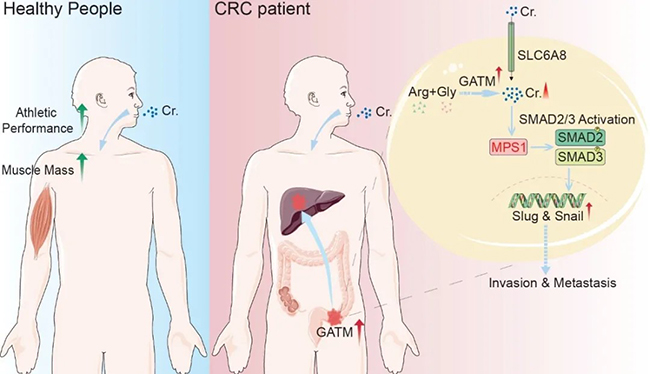Study Reveals Function and Molecular Mechanism of Metabolite Creatine in Cancer Metastasis
Cancer metastasis is the major cause of cancer-related death, and it is also the main challenge for cancer treatment.
Recently, a group led by Prof. PIAO Hailong from the Dalian Institute of Chemical Physics (DICP) of the Chinese Academy of Sciences (CAS), in cooperation with Prof. BU Pengcheng's group from the Institute of Biophysics of CAS and Prof. CHEN Gang's group from the 7th Medical Center of the PLA General Hospital, found that creatine from both dietary uptake and de novo synthesis can promote the colorectal cancer metastasis to liver via activating SMAD2/3 in TGF-β signaling.
This study was published in Cell Metabolism on April 2.

Creatine promotes cancer metastasis through activation of Smad2/3 (Image by WANG Wen, CHEN Di, and ZHANG Liwen)
The researchers established an in-situ mouse model of colorectal cancer to simulate the occurrence and development of colorectal cancer.They observed that supplementation of creatine could inhibit the growth of colorectal cancer in situ, but promote the metastasis of colorectal cancer and reduce the survival time of tumor-bearing mice.
Based on clinical tissues and mouse models, they further found that GATM, a rate-limiting enzyme for creatine biosynthesis, was highly expressed in liver metastatic colorectal cancer. Meanwhile, inhibition of GATM expression or activity could significantly inhibit the metastasis of colorectal cancer and prolong the survival time of tumor-bearing mice.
"The creatine could promote tumor cell invasion and metastasis by activating TGF-β downstream effector molecule SMAD2/3 and up-regulating the expression of SLUG/SNAIL," said Prof. PIAO.
This work was supported by National Natural Science Foundation of China. (Text by WANG Wen, CHEN Di, and ZHANG Liwen)